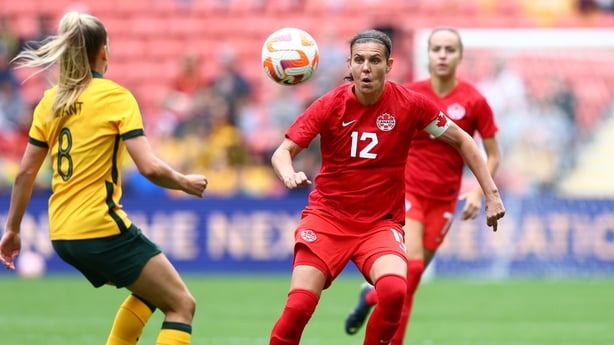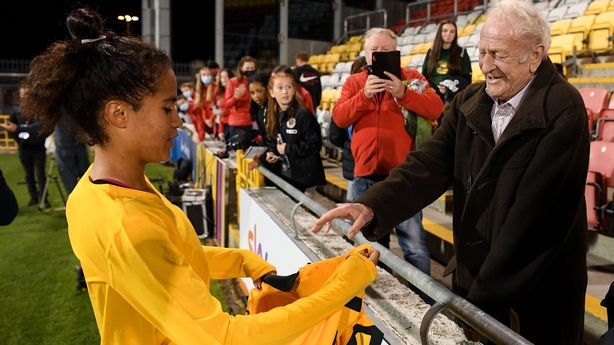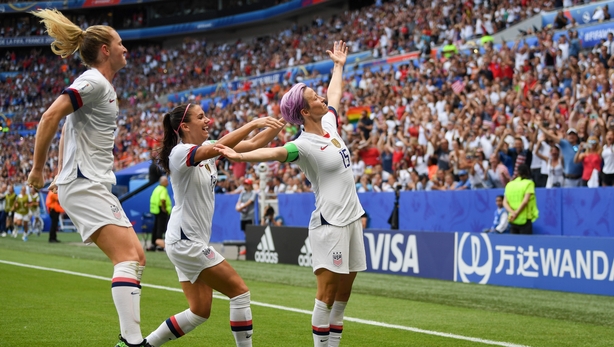Bigger, bolder and breaking new ground, the Women's World Cup kicks off in Australia and New Zealand on Thursday and Ireland are straight into the action as they take on one of the host nations in Sydney on the opening day.
Vera Pauw's side secured qualification to the prestigious event throughout a hard-fought, yet impressive, campaign and now rightly take their seat at the top table among the elite nations of the women’s game.
A baptism of fire, perhaps, for the emerging Ireland side as they face a very tough task in their quest to progress to the knock-out stages of the month-long tournament, starting with that testing opening game against Australia.
Canada, the highest-ranked side in the FIFA World Rankings not to receive one of the eight top seeds in the World Cup draw, and the Matildas look set to battle it out for top spot in the group.
Ireland are underdogs to go through, and will have to secure at least two good results in the group to have a chance of making it into the round of 16, while Nigeria, the remaining side in the group, are also expected to provide a stern test for Pauw’s side, despite the fact that they sit 18 places below the Irish in the FIFA world rankings in 40th place.
Australia come into the tournament in fine form, with recent friendly wins over European powers England and France that were part of a longer stretch of nine wins in their past ten senior international matches.
Canada are also tipped to go far in the tournament, while striker Christine Sinclair has 190 international goals - the most scored by anyone in the world, male or female, for a national team – and the 40-year-old will certainly get all the attention coming into the tournament, while 22-year-old Jordyn Huitema is also expected to shine.
Australia's all-time leading goal scorer Sam Kerr has found the net everywhere she's played. And it's a testament to her own high standards that her 12-goal campaign for Chelsea this season was considered a down year.

Featuring an expanded 32-team line-up and eight nations making their debut, the first edition in the southern hemisphere will be an affirmation of how far the women's game has come since the US won the inaugural 12-team tournament in China in 1991.
The 64-game showpiece gets underway on both sides of the Tasman Sea on Thursday, with New Zealand facing former champions Norway in front of a sell-out crowd at Auckland's Eden Park.
It will be a record attendance for a soccer match in the country if the expected 40,000 turn up.
On the same night, more than 80,000 are tipped to pack out Sydney's Accor Stadium for the home side's opener against Ireland, a record crowd for a women's soccer game Down Under.
The United States are favourites ahead of the start of the latest edition as they bid to extend their golden era by winning an unprecedented third straight title.
Four years on from dominating in France, the top-ranked Americans remain favourites to secure a record-extending fifth World Cup triumph with a new generation of players.
However, the landscape has changed irrevocably through the World Cup cycle, with money, talent and professionalism shifting to the sport's traditional European heartlands.
Once a cut above, the United States are now just one of a raft of nations with credible hopes of hoisting the trophy come the Sydney final on 20 August.
Germany, France, and Sweden all fancy their chances, while Australia's in-form 'Matildas' expect to go far under star striker Kerr and with the support of an army of green-and-gold fans.
England, of course, come into the tournament as European champions and came third and fourth at the last two World Cups.
However, there are question marks over their recent form, having not won an official match in regulation since February, albeit while testing themselves against other powers such as Brazil, Australia and Canada.
Denmark and China join England in Group D and are expected to challenge for the other place in the knock-out phase, with Haiti unlikely to make an impact.
England's Rachel Daly is in fine form, having scored 22 goals in the WSL for Aston Villa to win the Golden Boot in the English top flight, while Denmark's all-time leading scorer Pernille Harder had eight league goals and three more in the UEFA Champions League before making a summer move from Chelsea to Bayern Munich.
China's Wang Shenshan is the rare prolific international striker who at times doubles as a defender.
England's group is matched with Ireland's Group B in the round of 16, which could lead to a clash of the two nations in the knock-out stages, should Ireland upset the odds and progress.
Other tournament hopefuls include the aforementioned Canada, who upset the USA in the Tokyo Games semi-finals before securing the gold medal, and cannot be discounted as they look to give Sinclair a first title at her sixth World Cup.
While ticket sales have been slow in New Zealand, organisers have sold more than 1.25 million across the two co-hosts and healthy crowds are virtually guaranteed in sports-mad Australia.

Teams will compete for triple the prize money offered in 2019, which includes direct payments to players for the first time.
That will be a boost for many of the athletes, who have previously seen the proceeds of their toil go exclusively to national soccer federations.
Other players say the money is not nearly enough, given the $440m [€392m] prize pool for the men's World Cup.
Prize money for the women's tournament is $150m [€134m], which includes €37m allocated as "preparation money" to be distributed to clubs whose players compete at the tournament.
Basic pay remains a huge concern for many footballers at the tournament.
About a dozen of the 32 teams are still in negotiations with their federations around compensation and prize money, according to global players union FIFPRO.
Players will likely use the tournament as a platform to air grievances on pay and gender inequality, much as the USA women did in France in 2019.
Preparations have been smooth in the host countries, with each having a track record of holding major sporting events.
But global governing body FIFA were embarrassed by a standoff with broadcasters over the sale of rights, despite record viewership for France in 2019, and only recently agreed deals in the key European markets.
Though heaving crowds at European club matches have underlined growing interest in the women's game, the World Cup may also highlight a gap between the haves and have-nots.
Rich-nation teams have enjoyed long training camps and playing mums have brought children on tour, with on-call nannies paid by their federations.
Players from emerging nations have complained of scant preparations, with the Jamaican women setting up crowdfunding campaigns to help cover costs.

After kick-off, though, the sport will dominate.
Megan Rapinoe, who won the Golden Boot and Golden Ball in France, is back chasing more US glory at the age of 38.
Midfielder Alexia Putellas, back-to-back winner of the Women's Ballon D'Or, leads Spain's charge for a first title.
Emerging players will dream of taking their chance at an event doubling as a huge shop window for the world's top clubs.
Debutant nations like Morocco, the first Arab side to qualify for the tournament, hope their presence will open minds and break boundaries for women and girls back home.
"We will represent all Arabs in this great event that anyone hopes to participate in. We feel great joy and pride," said Morocco captain Ghizlane Chebbak.
Watch every game from the 2023 FIFA Women's World Cup live on RTÉ, with comprehensive coverage of the Republic of Ireland across television, radio and digital
Watch Republic of Ireland v Australia live on RTÉ2 and RTÉ Player on Thursday at 11am, follow a live blog on RTÉ.ie/Sport and the RTÉ News app or listen to live commentary on 2fm


